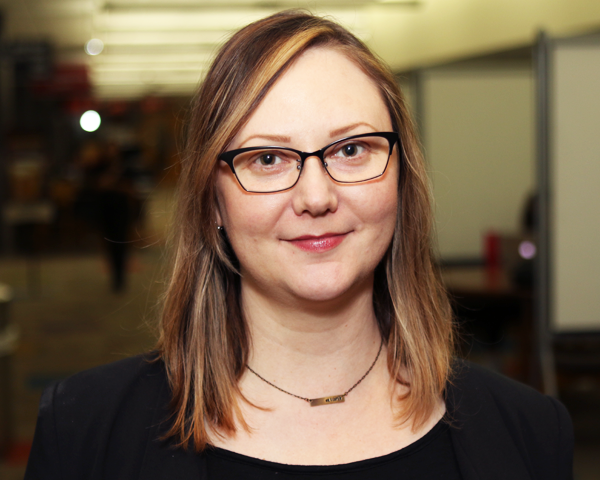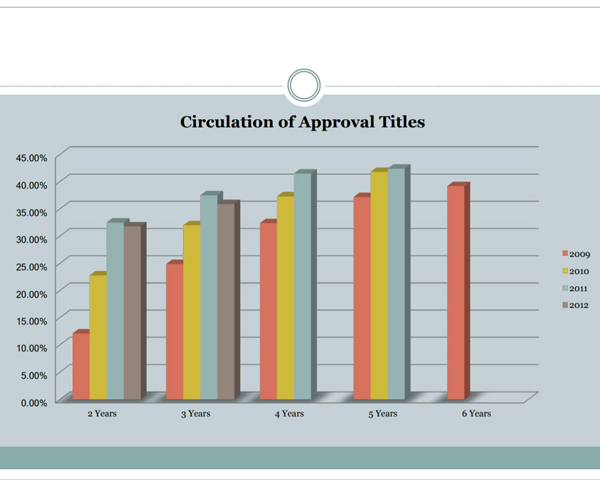
The Librarians Assembly held its Fall 2017 Professional Development Forum on September 25 in the Jones Room. Scheduled twice a year in the spring and fall, the Professional Development Forum is an opportunity for librarians and LITS staff to present on topics related to their professional development in a short, lightning-round format. Forum presentation topics include summaries of presentations given, papers written, projects completed, conferences attended, and updates on current research.
This year’s forum began with a brief overview of the Librarians Assembly from Jen Doty, the current convener. The Librarians Assembly is a librarian-led advocacy group that works with library leaders on matters related to librarians and includes all Emory libraries that report through LITS. It develops programming for librarians (including the Professional Development Forum), coordinates the librarian mentor program, and runs elections for the Librarians Assembly Council, the Committee on Relationships and Search Committee Pool, and the Peer Review Committee. For more information, visit the Librarians Assembly page on Staffweb or contact a council member.
The individual lightning talks began with Laura Akerman presenting IGeLU 2017, Saint Petersburg, Russia: 5 Things I Learned. Laura shared trends from the recent International Group of Ex Libris Users conference she attended in Russia, including the need for more robust support for customer issues and an overview of new directions that Ex Libris is pursuing. Laura had a busy but productive time at IGeLU this year, partnering with colleagues from other universities on the presentation Clusters from Outer Space: Primo Deduping and FRBRizing in Context and Reality, leading the Linked Data Special Interest Working Group meeting, and organizing the events and presentations for the annual IGeLU Developer’s Day.
 Rob O’Reilly then talked about the themes he has observed in data-related conferences over the past few years in Data Services and “Reproducible Research.” As opposed to traditional data services that are focused on collections and collection development, data management services and support for reproducible research represents a convergence of different facets of data services and includes a mix of data curation, data management, and review of code for data cleaning and analysis. Rob briefly covered the Curating and Reproducibility workshop at IASSIST 2017 conference, which outlined three different models for curating research materials for reproducibility, and provided links to three articles for audience members to learn more about reproducibility.
Rob O’Reilly then talked about the themes he has observed in data-related conferences over the past few years in Data Services and “Reproducible Research.” As opposed to traditional data services that are focused on collections and collection development, data management services and support for reproducible research represents a convergence of different facets of data services and includes a mix of data curation, data management, and review of code for data cleaning and analysis. Rob briefly covered the Curating and Reproducibility workshop at IASSIST 2017 conference, which outlined three different models for curating research materials for reproducibility, and provided links to three articles for audience members to learn more about reproducibility.
Next, Bernardo Gomez gave an overview of his presentation Streamlining Spine Label Workflow through ALMA API at IGeLU’s Developer’s Day in Saint Petersburg, Russia, with help from Laura Trittin. Bernardo and Laura worked together on a custom solution for reducing the amount of time required to print labels and take work orders off of new items using SpineOMatic (spine label processing software) and Alma.
Because Alma requires removing two work orders from different desks before an item shows up correctly as on the shelf, processing a batch of 150 items had been taking Laura’s team an average of 3.5 hours. Laura figured out how to capture a file of barcodes from labels printed from SpineOMatic, and Bernardo scripted a solution where that file is input into a webform and the two Alma work orders are automatically removed using Alma APIs. With Bernardo’s new workflow, Laura’s team can now process 150 barcodes in just eight minutes. Laura re-emphasized the impact that Bernardo’s solution has had on reducing the work her team performs: in the month of July they spent 18 hours removing work orders, but in August after Bernardo’s solution was in place, they only spent three hours performing the same task.
Kim Powell then presented on Highlights from The Librarian’s Role in the Reproducibility of Research Symposium, a summary of a recent workshop she attended as part of the Medical Library Association’s Annual Meeting in Seattle. A recent study by Nature revealed that 90% of researchers believe that there is a research reproducibility crisis. Kim offered a succinct definition of reproducible research and a quick overview of the reproducibility crises in pharmaceuticals and translational sciences.
The workshop illuminated data sharing and methods sharing as the two broad approaches to counteract the reproducibility crisis. It also discussed the librarian’s role in alleviating the reproducibility crisis by promoting awareness and education, engaging in collection development opportunities, adhering to data management best practices, partnering with institutional offices, and leading by example.
 Chris Palazzolo then gave an overview on research he is currently pursuing called, Trends in eBook vs Print Collection Usage—Methods and Preliminary Findings—Does Format Matter? Chris is conducting this research in preparation for a presentation at the Charleston Conference in November, a well-known and significant collection management and acquisitions conference.
Chris Palazzolo then gave an overview on research he is currently pursuing called, Trends in eBook vs Print Collection Usage—Methods and Preliminary Findings—Does Format Matter? Chris is conducting this research in preparation for a presentation at the Charleston Conference in November, a well-known and significant collection management and acquisitions conference.
For many years, we have performed usage analyses on print approval titles with the aim of fine-tuning the profile and improving the circulation of materials. As our eBook collections have grown through different acquisitions methods, Chris was curious to see whether eBook usage follows or deviates from print usage. The methodology involves comparing print approval circulation statistics with COUNTER BR2 data for several eBook collections to see whether format makes a difference in usage.
Wrapping up the forum, Courtney Chartier presented on Highlights from the Annual Society of American Archivists Meeting and from the International Foundation for Cultural Property Protection Conference. Instead of multiple tracks and sessions, the Society of American Archivists annual meeting in Portland this year was devoted to a single theme and track, the Liberated Archive. This theme touched on ideas of social transformation and radical inclusion to transform ways in which the human record is recorded. Non-archivist community members and organizers, like Interference Archive from New York, were encouraged to attend this year and lead sessions.
 Courtney noted that SAA’s keynote address, given by Walidah Imarisha, was of particular impact to the overall theme of disrupting white supremacist, patriarchal capitalist power structures. Courtney closed with an overview of the International Foundation for Cultural Property Protection conference and noted that the Rose Library is either at par or above for providing security measures for cultural property.
Courtney noted that SAA’s keynote address, given by Walidah Imarisha, was of particular impact to the overall theme of disrupting white supremacist, patriarchal capitalist power structures. Courtney closed with an overview of the International Foundation for Cultural Property Protection conference and noted that the Rose Library is either at par or above for providing security measures for cultural property.
Leave a Reply